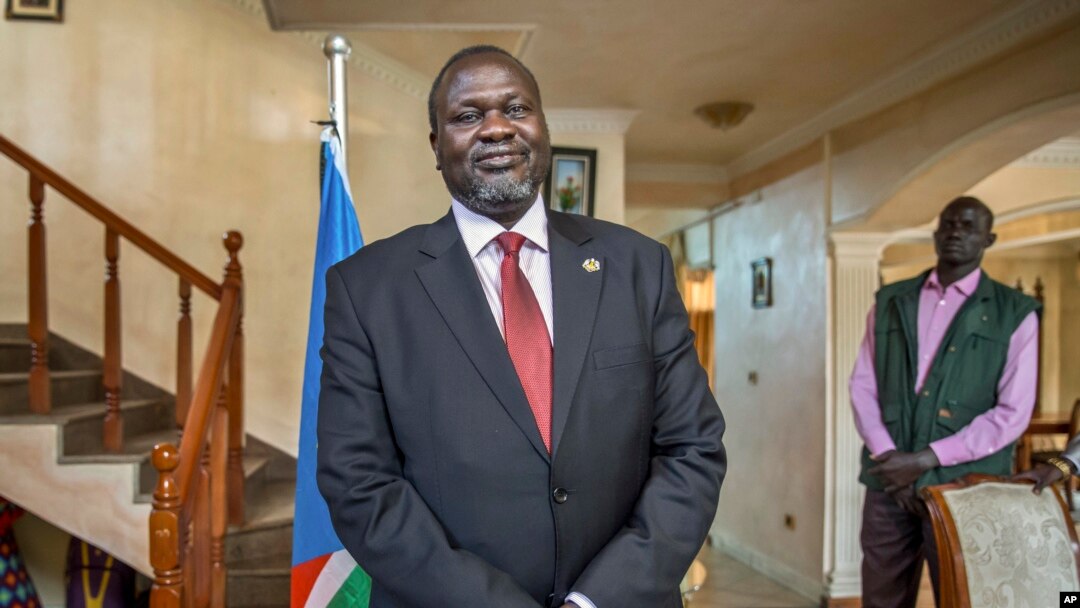Former Vice President Riek Machar has assured the people of South Sudan that 2016 will be the year of peace.
The rebel leader said his group is working hard to make sure people get the peace they have been yearning for since the start of the civil war more than 21 months ago.
Machar said he and his group were committed to the complete implementation of the August peace agreement. But he said President Salva Kiir’s creation of 28 new states without consultation had become an obstacle to the implementation.
“First of all, let me take this opportunity to wish the people of South Sudan a happy new year!" he said. "It will be a year where our people will enjoy peace which they have lacked for the last two years. We are working hard to ensure that the peace agreement which we signed on the 17th of August 2015 is implemented.”
On Thursday, the second group of 78 rebel advance team members arrived in Juba. Machar said the advance team under the leadership of General Taban Deng Gai has been doing a “wonderful job.”
“They met the president more than three times, they met the vice president, they met the speaker of the national assembly, and they met all those who are important," he said. "And the members of our advance team who are members of the Joint Monitoring and Evaluation Commission (JMEC) participated in the first-ever meeting of the JMEC. Also, the Joint Military Cease-fire Commission has met for the first time; the National Constitutional Amendment Committee, which is supposed to be amending the current transitional constitution, has also met."
But Machar said Kiir’s creation of 28 new states had thrown a monkey wrench into the implementation process.
People's will
On Thursday, Kiir called on his supporters to defend the creation of the 28 states, saying the decision was the will of the people and in line with the country’s transitional constitution.
“Everyone has to respect the will of the people," Kiir said. "The creation of the [28] states and the appointment of the governors were in fulfillment of the desire of the people, and if there are people rejecting it, the people who have called for [it] must ask them to provide answers to why they are against what the people want.”
He said the peace agreement was imposed on the country and therefore he had the right to alter it in order to accommodate views from the people of South Sudan.
“Now, there are people saying this is a violation of peace agreement," Kiir said. "They have forgotten that the agreement they are talking about [is] an imposed agreement which was not accepted by the people, and for us to accommodate these views and make lasting peace, we took into accounts the views of the people the same way we did for the agreement.”
The South Sudan government also accused the rebels of hypocrisy. After all, the government said, the rebels were the first to announce the creation of 21 states and even appointed governors.
Principle of federalism
But Machar said the rebels’ interest in creating states was based on the principle of federalism, or giving more power to the people. But he said the government and the mediators rejected the idea during the negotiations. Besides, Machar said, the suggestion was made before the August 2015 peace agreement was signed.
“We created the 21 states before we signed the peace agreement," Machar said. "They created 28 states 39 days after they signed the peace agreement. It’s not the establishment of the 28 states, it is the fact that the states they established are going to cause border wars between communities.”
In addition, Machar said the rebels’ creation of 21 states was based on delineated, demarcated borders created during British colonial rule over 50 years ago.
On security arrangements, Machar said rebel forces were preparing to go to Juba, probably by mid-January, to be part of the joint integrated security as mandated by the August peace agreement. But he said he didn't know whether the old government forces had moved out of Juba.
Machar reiterated his commitment to implementing the peace agreement irrespective of who is the leader of South Sudan because, he said, he’s happy with the agreement.


